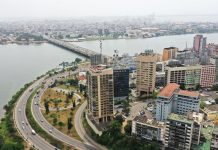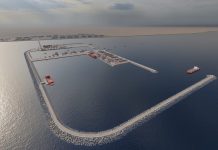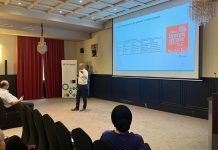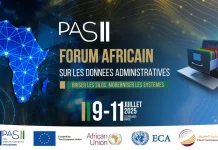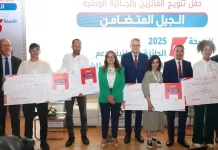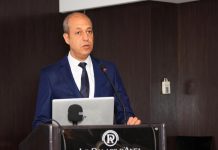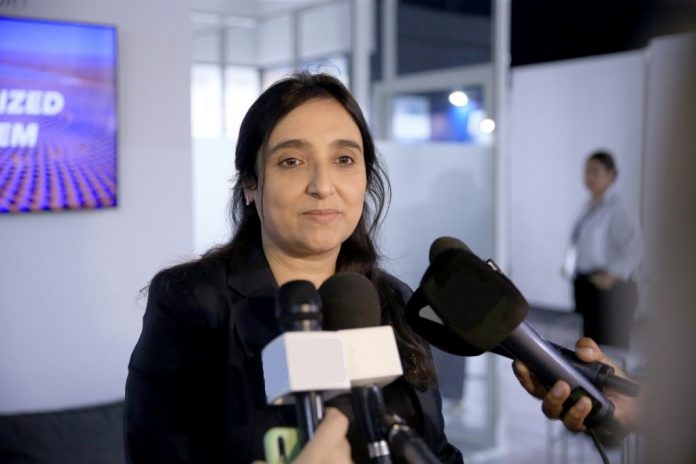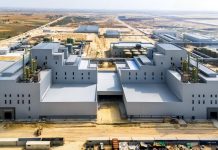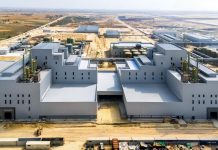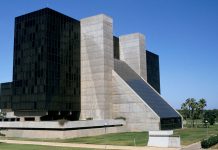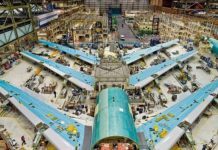In a context defined by the rise of global value chains, Morocco is positioning itself as a strategic hub in the aerospace industry. Thanks to a visionary royal strategy and an ambitious industrial plan, the Kingdom has attracted renowned players such as Boeing and Airbus while developing a strong and integrated local ecosystem. In an exclusive interview, Afaf Saïdi, Director of Aeronautics, Railways, Naval Industries, and Renewable Energies at the Ministry of Industry, discusses the major advancements of recent years, Morocco’s ambitions to establish itself as a global center of excellence, and the challenges facing this strategic sector.
How would you assess the development of the aerospace sector in Morocco in recent years? What have been the key milestones?
In just two decades, thanks to the visionary leadership of His Majesty King Mohammed VI, may God assist Him, Morocco has transformed its aerospace sector into a true success story, establishing itself as a key player in this strategic industry. This impressive achievement is built on a clear strategy and carefully planned investments, positioning the Kingdom as a hub of competitiveness and innovation.
Today, Morocco hosts approximately 150 leading companies, including Boeing and Airbus, drawn to specialized industrial zones such as Casablanca’s Midparc and world-class logistics facilities like the Tangier Med port. This has strengthened a diversified ecosystem that now spans eight major areas of expertise, from machining to electrical wiring, aerostructures, MRO (maintenance, repair, and overhaul), and engineering. This integrated network fosters robust synergies and boasts a local integration rate of nearly 42%.
Talent development also plays a central role in this dynamic. Through institutions like the Institute for Aeronautics Professions (IMA), over 14,800 young professionals have been trained to meet industry standards, with a 99% job placement rate.
Over the years, the sector has expanded into new activities, including those related to the engine, composites ecosystem, and even near-final assembly of aircraft. This diversification has progressively strengthened the sector’s capabilities and local integration into international value chains.
With clear ambition and meticulous preparation, Morocco aims to become a global center of excellence and reference in aeronautics, combining competitiveness and sustainability to meet future challenges.
What are Morocco’s strategic goals to strengthen its position in the globalaerospace industry?
With a bold national vision driven by innovation, sustainability, and resilience, Morocco aspires to become a global center of excellence in the aerospace sector. The Kingdom seeks to establish itself not only as a competitive and essential player but also as a leader in the industry of tomorrow. This ambition is underpinned by enhanced international collaboration, an agile industrial policy, and ongoing investments in cutting-edge infrastructure and the training of highly skilled professionals.
By anticipating industry transformations, Morocco is actively preparing to adapt to emerging trends, tackling challenges such as digital transformation, decarbonization, and technological innovation. Medium- and long-term prospects are promising, with a new generation of businesses and talent ready to make Morocco a global benchmark in aeronautics.
At the same time, Morocco continues to promote the « Made in Morocco » label, synonymous with quality and local expertise, while strengthening its industrial sovereignty. This strategic approach aims not only to meet the demands of major global contractors but also to enhance local integration and attract more foreign direct investment.
The last edition of the Marrakech Air Show was a major event. What were the key outcomes for Morocco’s aerospace sector?
The 7th edition of the Marrakech Air Show, held from October 30 to November 2, 2024, across more than 12,500 square meters of exhibition space, stood out as a true international showcase for the aerospace, defense, and aviation sectors. Organized under the High Patronage of His Majesty King Mohammed VI, this edition brought together over 200 exhibitors, professionals, and official delegations from around the globe, providing an exceptional platform for sector stakeholders to present their latest technological innovations. The event also facilitated the creation of partnerships and the signing of strategic agreements aimed at opening new growth prospects for Morocco’s aerospace sector.
This edition significantly boosted Morocco’s visibility on the international stage, reaffirming its position as a strategic hub for the aerospace industry. The event witnessed a notable increase in partnerships with global companies, cooperation agreements, and heightened interest from international investors.
Not only did the Marrakech Air Show enhance the country’s appeal to leading industry players, but it also demonstrated Morocco’s potential to support innovative projects and further develop its industrial ecosystem.
How will the new partnerships signed accelerate the training of local talent andfoster knowledge transfer?
The new partnerships forged during the 2024 Marrakech Air Show play a critical role in accelerating the training of local talent and transferring expertise to Morocco’s aerospace sector. These agreements, signed with globally renowned companies, are part of a dynamic strategy to strengthen the country’s human and technical capabilities in this strategic industry.
One of the flagship projects is the creation of the Africa Center for Manufacturing Excellence (ACME) in collaboration with Boeing and Mohammed VI Polytechnic University. This advanced research and training center aims to equip Morocco with cutting-edge expertise in aerospace engineering, thereby reinforcing its role as a regional leader in technology and innovation.
Additionally, the newly announced investment projects will lead to significant job creation in the production of aeronautical components. These initiatives will bolster local capacities while accelerating the acquisition of technical skills through on-the-job training.
These agreements extend beyond economic opportunities; they are also part of a sustainable approach to developing local talent. By positioning Morocco as a center of excellence in aerospace training and innovation, these partnerships will ensure a vital transfer of knowledge that will contribute to the global development of Morocco’s aerospace industry.
Aircraft maintenance and repair represent a significant part of the aerospace value chain. Does Morocco have specific plans to develop this segment?
Thanks to its ideal geographic location at the crossroads of Europe and Africa, Morocco is positioning itself as a strategic hub for aircraft maintenance, repair, and overhaul (MRO) in Africa. Modern infrastructure provides world-class facilities for airlines and aerospace players.
Partnerships with industry leaders are strengthening Morocco’s rapidly expanding MRO ecosystem. For instance, Safran recently invested 1.3 billion dirhams in a new 25,000 m² facility in Casablanca dedicated to maintaining LEAP engines. This project, which is expected to create 600 jobs by 2030, exemplifies Morocco’s commitment to developing a competitive and sustainable MRO offering, addressing the needs of African, European, and Middle Eastern airlines.
Additionally, Brazilian aircraft manufacturer Embraer has signed a memorandum of understanding to launch joint projects, particularly in aircraft maintenance.
Access to a skilled workforce trained by specialized institutions like the Institute of Aeronautics Professions (IMA) and ISMALA is another key pillar of this ambition. These centers work closely with industry players to prepare technicians with specific expertise for MRO operations involving aircraft structures, engines, and components.
With a clear strategic vision, cutting-edge infrastructure, and a highly qualified workforce, Morocco is emerging as a key MRO player in Africa, offering airlines competitive and high-quality fleet maintenance solutions while anticipating the needs of tomorrow in a rapidly growing industry.
What types of training and investments are being implemented to meet the skill demands of Morocco’s aerospace industry?
Morocco’s aerospace sector is supported by a structured and efficient training system designed to address the industry’s growing demands. This system relies on specialized institutions such as IMA and ISMALA, complemented by university programs and engineering schools. Together, these entities play a central role in developing the qualified human capital necessary for the sector’s competitiveness.
These institutions are the cornerstone of Morocco’s aerospace training network, offering high-level technical training aligned with international standards and technological innovations in the field.
Universities and engineering schools also contribute by preparing engineers and managers with advanced skills in areas such as robotics, artificial intelligence applied to aviation, and complex systems. Collaborating closely with companies like Boeing, Airbus, and Safran, these institutions regularly update their curricula to reflect technological advancements and market needs.
Beyond initial training, Morocco’s aerospace training framework incorporates continuous education modules to help professionals keep their skills current. Given the sector’s constant evolution—with emerging technologies like additive manufacturing and automation—these programs provide workers with the tools to adapt their expertise to new innovations and industry requirements.
Companies themselves play an active role in this process by investing in team training to enhance quality and productivity. This ensures that Morocco’s workforce remains globally competitive while adopting advanced technologies and meeting the sector’s rigorous standards.
The various training initiatives aim not only to meet current industry needs but also to anticipate future challenges. Training institutes collaborate with international partners to introduce innovative programs aligned with emerging trends such as green mobility and decarbonization. These efforts not only cultivate a pool of qualified talent but also enhance Morocco’s attractiveness to foreign investors seeking cutting-edge technical expertise.
Morocco’s aerospace training model is a successful example of planning and collaboration between training institutes, companies, and public stakeholders. By offering robust initial training, integrating continuous education, and anticipating future needs, this model ensures the country can meet the sector’s growing demands. It also positions Morocco as a key player in global production while providing enriching career opportunities for young talent and experienced professionals.
What major challenges does Morocco’s aerospace sector face today, and what measures is the Ministry considering to address them?
As the global aerospace industry undergoes transformations driven by technological revolutions, ecological transition, and market fluctuations, Morocco is emerging as a determined player ready to tackle tomorrow’s challenges. With a bold and forward-thinking strategy, the country is fostering sustainable innovation to solidify its status as a reference industrial platform in Africa and globally.
Facing environmental imperatives, Morocco places green transition at the heart of its industrial model, recognizing the urgency of climate change and the new sustainability requirements. The country is investing in eco-friendly technologies and committing to reducing the carbon footprint of its infrastructure, positioning itself as a low-impact production hub. This environmental commitment attracts international companies seeking industrial partners engaged in sustainable practices.
To address the aerospace industry’s rapid transformations, Morocco has made human development a central pillar of its strategy. By collaborating with global industry leaders, the country is deploying advanced training programs to equip young Moroccans with essential skills in cutting-edge fields such as aerospace engineering, complex system design, and innovative composite materials production. These initiatives not only meet the immediate needs of major clients but also ensure a qualified and competitive workforce for the future.
In a competitive global context, Morocco also leverages the « Made in Morocco » label as a symbol of quality and local expertise. This label is becoming a strategic asset, showcasing Moroccan know-how and strengthening the country’s industrial sovereignty. This approach addresses the needs of international groups while promoting local integration and attracting foreign investment, ensuring a decisive competitive edge for Morocco’s aerospace sector.
Morocco is not merely adapting to global transformations but actively anticipating and engaging with them. Its proactive strategy, combining sustainability, innovation, and the development of local talent, allows the country to position itself as a forward-thinking model in the global aerospace industry. With this integrated vision, Morocco is well-prepared to face 21st-century challenges and inspire other nations with its exemplary, future-oriented approach.Haut du formulaire
What infrastructure or innovation projects are underway or planned to attract more foreign investments in the sector?
Morocco is currently deploying several strategic infrastructure and innovation projects to strengthen the attractiveness of its aerospace sector and attract more foreign investments. Among the flagship initiatives is the expansion of dedicated industrial zones, such as the Midparc Industrial Platform, which is being expanded to accommodate more international companies and offer them an ecosystem tailored to the aerospace industry’s requirements.
In terms of innovation, Morocco places a strong emphasis on eco-friendly and digital technologies. The development of dedicated research and innovation centers, particularly in engineering, the design of complex aerospace systems, and the production of composite materials, aims to position Morocco as an advanced and high-value-added technological hub. These centers, such as Safran University Morocco, are created in partnership with global leaders, fostering technology transfer and the development of local expertise.
In parallel, high-level training projects, designed in collaboration with major companies in the sector, are being implemented to build a skilled workforce capable of meeting the technical needs of foreign investors. This integrated strategy, combining modern infrastructure, innovation, and talent development, makes Morocco an attractive and competitive choice for international investors in the aerospace sector.
How does Morocco incorporate sustainable and innovative practices into its aerospace sector? Are there specific ongoing or upcoming projects to address these challenges?
Morocco integrates the energy transition at the heart of its industrial development, particularly in the aerospace sector. Aware of the ongoing transformations, the country adopts a proactive approach to adapt its industry to global trends, aiming to become a regional platform for decarbonized industrial production.
In this regard, the Kingdom, a pioneer of energy transition in Africa, has committed to producing more than half of its electricity from renewable sources by 2030. This ambition aims to provide its industrial sector with clean and competitive energy while enhancing its attractiveness as an industrial platform. The aerospace industry, in particular, is poised to benefit from this dynamic by strengthening its position on the international stage and accelerating its transition toward more sustainable production.
Aviation, a key sector of Morocco’s economy, is also at the center of this transition. The Kingdom is actively engaged in strategic discussions for the development and adoption of Sustainable Aviation Fuels (SAF), a breakthrough technology offering a clean alternative to fossil fuels. By partnering with leading international players, the country aims to become a global leader in the production and export of SAF while exploring the full potential of synthetic fuels to decarbonize the aviation sector.
Furthermore, Royal Air Maroc has achieved a historic milestone by operating the first commercial flight in Africa partially powered by SAF. This inaugural flight, connecting Casablanca to Dakar, demonstrated the feasibility and environmental benefits of this solution. The airline aims to achieve carbon neutrality by 2050 and plans to incorporate 10% SAF into its operations by 2030.
By integrating innovative solutions such as SAF and low-carbon technologies into its aerospace sector, Morocco is not merely following trends—it is anticipating them. This strategic positioning, coupled with a favorable regulatory framework and sustained investments, establishes the Kingdom as a center of excellence in sustainable aviation.







